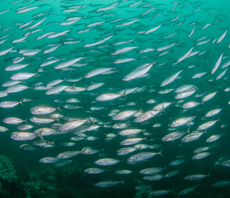‘Concerning’: Mackerel taken off sustainable seafood menu amid overfishing concerns


Marine Conservation Society’s latest ‘Good Fish Guide’ relegates mackerel from green list, while eel and Celtic cod remain on unsustainable red list
Mackerel is no longer deemed a sustainable seafood choice after the Marine Conservation Society (MCS) has warned that populations of the fish have been in steady decline in recent years and it is now at risk of overfishing.
That is the headline recommendation from the non-profit’s latest ‘Good Fish Guide‘ today, which uses a traffic light system to help consumers and businesses make sustainable seafood choices depending on how or where a species is caught or farmed and covers all seafood sold or produced in the UK.
Its latest update has relegated Northeast Atlantic mackerel from the green list – which sets out what the non-profit deems to be the “best choice” for sustainable seafood options – down to the amber list, items on which it describes an “ok choice”.
MCS warned that declining mackerel populations could have a detrimental effect on wider ecosystems as the fish is an important prey for whales, dolphins and tuna. It added that overfishing to key species in delicate food webs also heaped “unwanted additional pressure” on oceans that are also facing major challenges from climate change, ocean acidification, and warming seas.
“The northeast Atlantic mackerel population has been declining since 2015, which is concerning,” warned Charlotte Coombes, Good Fish Guide manager at MCS. “Fishing communities and wildlife depend on this species, but continued overfishing is putting both at risk. International cooperation is the only way to fix this problem, and UK governments must lead by example. We need to see countries agree on quotas, and extra management measures being put in place to protect stocks.”
Mackerel is commonly caught by various countries, including the UK, Norway, Iceland, and across the EU.
The warning is particularly significant for the UK, which takes around 17 per cent of the world’s total mackerel catch, mostly from Scottish fishing boats that catch more mackerel than any other species. In 2021, more than 220,000 tonnes of the fish – worth around £240m – were caught in the UK, representing 32 per cent of the UK’s total catch, according to MCS.
However, MCS said all major seafood producing countries were failing to work together to tackle overfishing. While countries generally agree that scientific limits on fishing should not be exceeded, they do not agree on how to divide the catches between themselves, according to MCS.
As such, it said quotas have been higher than scientifically recommended limits since 2009, exceeding them by between five per cent and 80 per cent. In 2022, the combined catch limits set by all countries totalled more than 1.2 million tonnes of mackerel, which exceeds the scientific advice on how much should be caught by 42 per cent, according to the Good Fish Guide.
Elsewhere in the latest Food Fish Guide, which reviewed 186 species, European eel and Celtic cod have remained on the red-rated ‘Fish to Avoid’ list.
“Eel is still appearing on menus across the country, despite being more endangered than the Bengal tiger,” said Jack Clarke, sustainable seafood advocate at the Marine Conservation Society. “Populations have declined by as much as 95 per cent in the past decade and recent scientific advice couldn’t be clearer – it’s time to stop eating eel. It’s the most trafficked animal on the planet, with an illegal eel trade estimated to be worth £2.5bn every year.”
Last month countries met to decide how to divide the next set of quotas, but there has yet to be a breakthrough on agreeing a way forward and talks are ongoing.
In the UK, MCS urged the government to support better management of fish stocks with a whole ecosystem approach, as well as more data to be collected on boats at sea.
It argued cameras on boats, or Remote Electronic Monitoring (REM) with cameras, would be able to monitor what has been caught to provide the data needed to allow scientists and governments to make informed decisions about how much seafood to catch, as well as help reduce overfishing and putting better management measures in place such as reducing bycatch.








